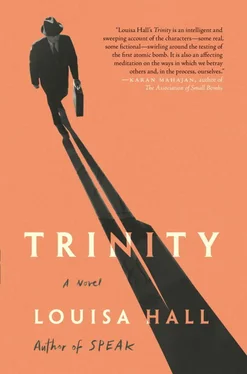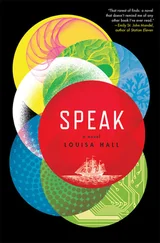But if I am trying to represent those months precisely, it’s important to capture my frame of mind at the time.
During those months, when I was trying to piece back together the reality that we’d lived in, my husband and I were still sleeping together. In fact, the minutes while we were sleeping together were the only minutes of the day in which I could persuade myself that everything had been patched up again, because as soon as he removed himself from my body, I remembered again the feeling I’d experienced when we were sitting on the back porch, when, with each failed attempt he made at telling the truth, it had seemed that a knife had been swiftly drawn from my stomach.
And so each time we slept together felt like a murder, and afterward my murderer lay beside me and kissed me and tried to hold me so the death at least wouldn’t hurt. In his arms, I lay in our bed, slowly but inevitably dying, knowing I would continue to do so until he began to run his hand up my back once again, until he cupped my breast in his palm, until he spread my legs with his knee and did that which seemed to be in his power alone to fill the hole that he’d opened.
PERHAPS IT’S INCORRECT TO SAY THAT AN INFIDELITY FEELS LIKE Amurder. But some people feel things correctly. Some other people, unfortunately, don’t. In early August, for instance, while I was dropping our son at day care, I heard strange popping sounds coming from the direction of campus, and then for nearly an hour I heard the sound of wailing sirens.
When my husband came home that night, he told me there had been a shooting on campus.
The news barely penetrated the fog of my own obsessions. I was feeding our son, he had to be put to sleep, and afterward there was a life to put back together.
But in the morning, I opened the paper and learned that Charles Whitman had killed his mother and his wife, and had then gone to the UT Tower, from which vantage point he had used a rifle and an array of other firearms to kill thirteen people and injure thirty-two others.
It was a terrible, violent story, horrid enough to distract me for a few minutes from my own much smaller but still entirely preoccupying disaster. Then—because, when we’re afraid or panicked or lost, as so many of us so often are throughout the course of our lives, it’s impossible to sustain for any extended period our sense that strangers, the victims of violence far away, are as real as we are, as frightened as we are, as sensitive to pain or disaster as we feel ourselves to be—I focused on my own life, and dropped my son off at day care, and tried to shake the sound of his crying while I walked back to our house.
When I’d arrived, I sat down on the same swing where I’d confronted my husband, and read about the events leading up to the shooting.
On the afternoon of July 31, Charles and his wife, Kathy, had visited friends. They left early enough in the evening so that Kathy could get to her night shift, and while she was there, Charles wrote a suicide note that read—and I remember this, because later I often took the article out and reread it—“I do not understand what it is that compels me to leave this letter. Perhaps it is to leave some vague reason for the actions I have recently performed. I do not really understand myself these days. I am supposed to be an average reasonable and intelligent young man. However, lately (I cannot recall when it started) I have been a victim of many unusual and irrational thoughts.”
Then he drove to his mother’s apartment on Guadalupe. After killing her, he left a note by her body: “To Whom It May Concern, I have just taken my mother’s life. I am very upset over having done it. I am truly sorry. Let there be no doubt in your mind that I loved this woman with all my heart.”
After that, he returned to his home on Jewell Street. His wife had gotten home from her shift, and he killed her by stabbing her three times in the heart. Then he finished his suicide note: “I imagine it appears that I brutally killed both of my loved ones. I was only trying to do a thorough job.”
The next morning, he rented a truck. Then he drove to the hardware store, where he purchased a Universal M1 carbine, two ammunition magazines, and eight boxes of ammunition. After that, he drove to Chuck’s Gun Shop, where he purchased four further carbine magazines, six additional boxes of ammunition, and a can of gun-cleaning solvent. From there he drove to Sears, where he purchased a twelve-gauge semiautomatic before returning home, where he sawed off his shotgun and packed it in a bag, along with a Remington hunting rifle, a .30-caliber carbine M1, a Luger pistol, a Galesi-Brescia pistol, a Smith & Wesson Magnum revolver, over seven hundred rounds of ammunition, food, coffee, vitamins, Dexedrine, Excedrin, earplugs, jugs of water, matches, lighter fluid, rope, binoculars, a machete, three knives, a transistor radio, toilet paper, a razor, and a bottle of deodorant. Then he headed off to the tower.
THESE WERE THE DETAILS I READ ABOUT IN THE PAPER. WHEN I’Dfinished reading, I neatly clipped the article and folded it in the drawer where I kept my stockings.
Still, I couldn’t stop thinking about it. Though it was difficult for me to comprehend—or to even try to comprehend—the pain of the victims, it seemed essential to me to understand the mind-set of the perpetrator.
Later that day, while I picked up milk at the grocery store, and while I vacuumed the rug, and later while I nursed our child on the green chair by his crib, I found I was incapable of shaking those words from my head: “I do not understand what it is that compels me . . . Perhaps it is to leave some vague reason for the actions I have recently performed.”
In my mind, those words repeated themselves, over and over, like some kind of dangerous spell. It occurred to me that, in this case, as in so many others, a basic mental cloudiness had permitted extraordinary violence.
Most often, I said to myself, the worst brutality occurs not as a result of pure evil, if such a thing even exists, but because of a person’s frustrating inability to explain his motivations either to himself or to others.
So many of us, I thought, when I was nursing my child, go through our lives making little real effort to understand why we behave as we do, and are therefore forced to act abruptly and with more force, simply to cover up our lack of any good explanation, so that we fly around through the world like so many dull knives, more dangerous to cut with than sharp ones.
That’s what I was thinking about, while I nursed our son the night after I clipped that article out. And it was that night, after I sang to him about ash trees and the lost friends of a childhood, after I’d placed him in the crib and lightly rocked the small of his back until it seemed he’d released whatever frustration and fear had kept him crying all day and finally settled into sleep, that I walked back out of the warm darkness of his bedroom, into the light of our living room, and my husband met me and guided me to the couch.
HE SAT BESIDE ME. THEN HE TOOK MY HAND.
For a moment, he couldn’t draw his eyes away from my hand, with the result that I, too, stared at it for a moment and realized that it didn’t look like my own hand.
Then my husband started to speak. He told me he’d come to understand that his presence in our house was a mistake. He could see it was causing me too much distress, and could only continue to do so, whether I wanted to admit it or not.
You’re not happy, he said. You’re not yourself anymore.
Then he said, you’re not even writing.
I THINK I TRIED TO PROTEST, BUT HE SHOOK HIS HEAD AND PULLEDme up short. We were both still staring at that strange hand.
Читать дальше












